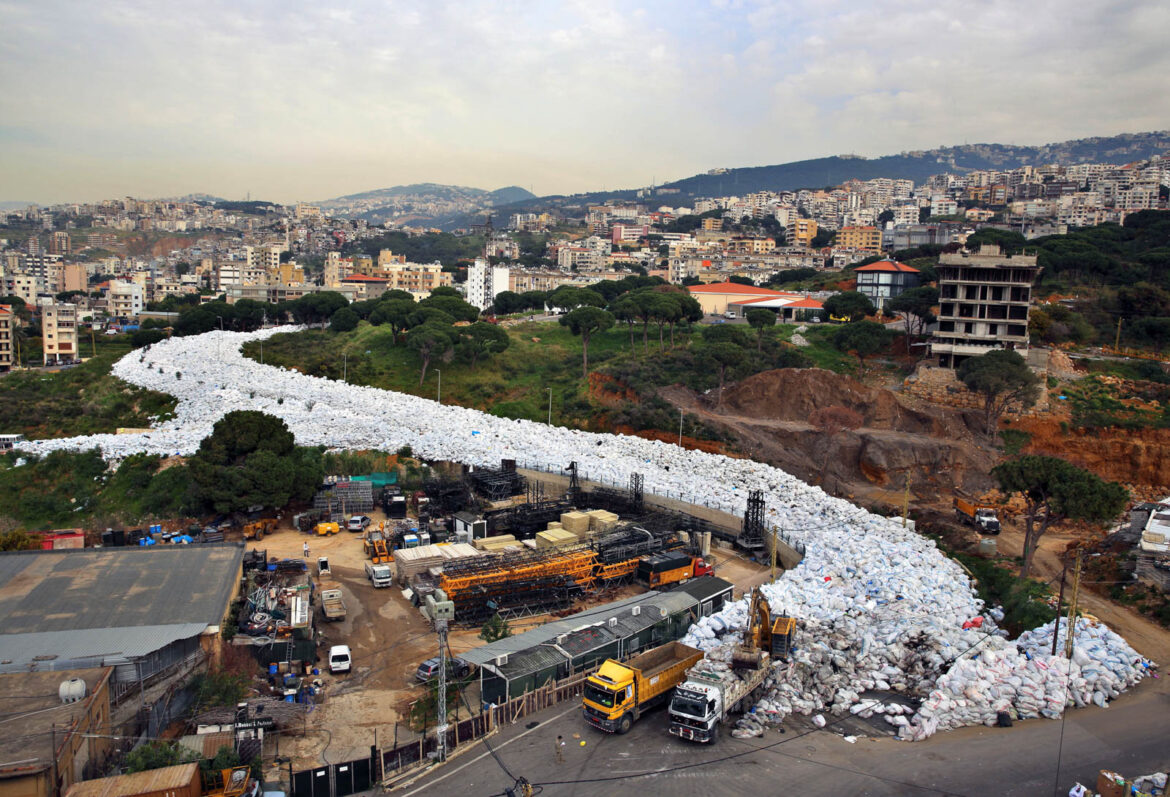“A thousand times dead, a thousand times relived,” echoes Lebanon’s history. Injustices. Corruption. Theft. Revolt. Resistance. Persistence. This phrase encapsulates the resilience of a nation striving to live in a country that mirrors its true essence, battling not just the stereotype of violence, extremism and terrorism, but also an array of socio-economic and political crises; a nation striving to exist, to breathe. Among these, the environmental degradation in Lebanon, exacerbated and caused by neglect and mismanagement by the authorities, adds a layer to the deliberate depression into which the country is plunged.
Lebanon’s environmental crisis is multi-dimensional, involving issues like waste management failures, deforestation, climate change impacts, misuse of fossil fuels, rampant air pollution, and the deterioration of water and land resources. These issues, combined with the catastrophic Beirut port explosion and the COVID-19 pandemic, illustrate a grim reality of systemic environmental neglect, weakened infrastructure, and heightened vulnerability among the population, leading to a compounded crisis that threatens public health, economic stability, and the overall well-being of Lebanon’s society. This reality is further darkened by the elites that allowed it to occur, coupled with the populace’s irresponsibility, necessitating an urgent call for solutions.
Waste management issues
Lebanon’s waste management challenges are multifaceted, stemming from congested traffic, closed landfills without adequate alternatives, widespread corruption, ineffective incineration practices, and a critical lack of waste analysis laboratories. These issues lead to the visible crisis of garbage piling up on the streets of Beirut, emblematic of a decades-old failing waste management system. The absence of efficient disposal and recycling processes exacerbates environmental degradation and compromises water quality, endangering ecosystems and public health alike. This predicament is intensified by the lack of a cohesive strategy for waste reduction and recycling, making it imperative for Lebanon to explore innovative solutions to overcome this environmental nightmare.
In contrast, nations with successful waste management systems, such as Sweden, demonstrate the importance of integrating advanced recycling technologies, comprehensive waste sorting at the source, and strong policy frameworks that encourage waste reduction and responsible consumption. Sweden’s approach, which includes converting waste into energy to heat homes and fuel transport, alongside an emphasis on recycling, highlights the critical role of government initiative, public participation, and investment in sustainable waste management infrastructure. Adopting such models could offer Lebanon a pathway to mitigating its waste management crisis by not only addressing the immediate issue of waste accumulation but also promoting long-term environmental sustainability and public health protection.
Deforestation
Deforestation in Lebanon has escalated due to illegal logging, urban expansion, and agricultural development, with its storied cedar forests—a national emblem and a repository of biodiversity—facing unprecedented threats. Historically, these forests covered a significant portion of Lebanon’s landscape, but today, they are a fraction of their former expanse. The exact scale of deforestation is stark: Lebanon has seen its forested areas diminish alarmingly over the past decades, with estimates suggesting that up to 25% of its original forests have been lost to human activities each year between 2018 and 2021. This reduction has not only compromised the ecological balance, including water regulation and soil stability but also endangered the cedar trees themselves, which have been a part of Lebanon’s heritage for centuries.
The consequences of this deforestation extend beyond the loss of iconic landscapes. The cedar forests, vital for their ecological role in maintaining biodiversity, and water cycles, and preventing soil erosion, are integral to supporting Lebanon’s unique flora and fauna. The decrease in forested areas has led to a tangible impact on the environment, exacerbating the risk of mudslides, flooding, and droughts. Furthermore, the decline in cedar forests symbolizes a broader crisis of biodiversity loss and ecological degradation.
In facing this challenge, it’s crucial to contextualize the environmental impact through specific data. For example, initiatives aimed at reforestation and conservation have been implemented, yet the pace of recovery lags behind the rate of loss. The plight of Lebanon’s cedar forests calls for immediate action to preserve this irreplaceable natural heritage for future generations.
Fossil fuels & climate change
The impact of climate change is profoundly felt in Lebanon, intensifying existing environmental challenges through rising temperatures and shifting precipitation patterns. The country’s energy sector, heavily reliant on fossil fuels such as oil and natural gas, sourced both domestically and imported, notably from Middle Eastern neighbours, significantly contributes to its environmental footprint, with a share of oil products in energy consumption at 70%, transport dependency on oil at 89%, and motor gasoline usage constituting 72%. This reliance exacerbates Lebanon’s contribution to global warming and air pollution, adversely affecting public health and the agricultural sector. Moreover, these fossil fuel dependencies make the shift towards sustainable energy solutions more complex and urgent.
The consequences of climate change, manifesting as more frequent and severe droughts, unpredictable rainfall, and rising temperatures, are directly linked to a decrease in agricultural productivity. These shifts in weather patterns thereby threaten food security and the livelihoods of many, exacerbating the vulnerability of communities dependent on farming.
This situation underscores the urgent need for Lebanon to diversify its energy sources, incorporating renewable energy to reduce its carbon emissions and mitigate the adverse effects of climate change.
Air Pollution
Air quality in Lebanon suffers due to vehicle emissions, industrial activities, and the widespread use of generators. This pollution has severe health implications, including respiratory issues and cancer, and is compounded by significant noise pollution from generators. The air quality in urban centers, particularly Beirut, has significantly deteriorated, resulting in increased cases of respiratory problems among the population; nine out of ten people now breathe polluted air. Updated estimates reveal an alarming death toll of 7 million people every year caused by ambient and household air pollution and more than 65% of the premature deaths in Lebanon are attributable to air pollution (2,600 annual fatalities). To reverse this trend and align with more sustainable environmental practices, Lebanon needs to implement stringent regulations on industrial emissions, encourage the adoption of cleaner transportation technologies, and invest in renewable energy sources to decrease the reliance on fossil fuel-powered generators.
Water Degradation
Contrary to the situation in North America where tap water is generally safe to drink, Lebanon presents a stark contrast. The country’s water infrastructure suffers from significant pollution and neglect, leading to dire quality issues. Industrial waste, sewage, and agricultural runoff are major contributors to this problem, freely contaminating rivers and reservoirs that are essential sources of domestic water. A distressing illustration of this environmental calamity is the Litani River. Once celebrated for its natural beauty and resourcefulness, it is now marred by heavy pollution from waste and chemicals. This deterioration not only devastates aquatic ecosystems but also jeopardizes the health of communities dependent on its water, with waterborne diseases along the river’s vicinity becoming increasingly common. As a result, cancer rates along the river have skyrocketed to 4.5 times the national rate with over 45 million cubic meters of industrial pollutants, sewers, pesticides, and phosphates carried by the Litani River to the lake. “We are plagued by mosquitoes that spread diseases, suffer from itching and stomach problems,” said Maha, a farm worker who lives in a refugee camp near the river.
Recent statistics highlight the severity of the issue, with more than 52% of Lebanon’s population lacking access to safe drinking water. As a result, many Lebanese have no choice but to rely on expensive bottled water for their daily consumption, exacerbating the country’s environmental footprint due to the increased production of plastic waste. To address these critical issues, Lebanon must undertake comprehensive reforms and initiatives aimed at revitalizing its water infrastructure. This could include investing in modern wastewater treatment facilities, enforcing strict regulations on industrial discharge, promoting sustainable agricultural practices to reduce runoff, and implementing rigorous water quality monitoring and management programs.
Lebanon’s Generator Problem
One of Lebanon’s biggest problems is the frequent power outages, a direct consequence of the mismanagement and corruption among the country’s ruling elites. These individuals have consistently failed to invest in and maintain the national power infrastructure, diverting funds intended for energy projects to their own interests. This chronic neglect has left the energy sector in a dilapidated state, unable to meet the demand for reliable electricity. As a result, reliance on private generators has become the norm. This mixed solution has solidified a parallel energy economy, burdening households with exorbitant electricity costs. The widespread use of diesel-powered generators has further exacerbated air pollution, contributing to environmental degradation and public health issues. The noise pollution from these generators disrupts daily life, while their emissions pollute the air, making the cities’ atmospheres heavier and unhealthier. This reliance on generators highlights the critical state of Lebanon’s energy sector, marred by inefficiency and corruption, leaving the population to grapple with the consequences.
Impact of the Beirut Port Explosion
The Beirut port explosion in August 2020 dramatically intensified Lebanon’s environmental challenges, particularly in air pollution. The catastrophic blast released toxic chemicals, including ammonia and heavy metals, into the air, severely compromising air quality. In the long term, the dispersion of these pollutants has the potential to worsen the already very present risk of chronic respiratory problems and other health issues among the population. Additionally, the soil and waterways around Beirut have been contaminated, posing a risk to agriculture and marine life, further destabilizing the region’s ecological balance and food security.
Conclusion
Lebanon stands at a crossroads, with environmental degradation posing a severe threat to its future. While the country has established environmental laws such as the Environmental Protection Law aimed at regulating waste management and protecting natural resources, and governance frameworks intended to oversee environmental policies, these efforts have often faltered in practice. The failure to effectively address Lebanon’s environmental challenges is largely attributed to a lack of robust enforcement mechanisms, political will, and widespread corruption within governmental bodies. Furthermore, there’s been insufficient investment in necessary infrastructure and a notable absence of comprehensive strategies for public engagement in environmental conservation.
Solutions include investing in renewable energy, improving waste management infrastructure, enforcing environmental regulations, and promoting sustainable practices. The international community’s support, coupled with local efforts to combat corruption and mismanagement, is essential for Lebanon to navigate its path away from disaster. This journey is not just about salvaging the environment but also about securing a sustainable and prosperous future for all Lebanese.
Edited by Amina Kudrati-Plummer

Born in Montreal, but having lived my entire life in Lebanon, I’ve developed a deep-rooted connection to my home country and a profound passion for Middle Eastern politics. My experiences have inspired me to pursue a double major in Political Science and Economics at McGill University, where I strive to deepen my understanding of the complexities of regional and global issues.

